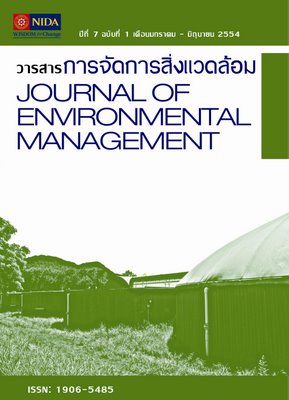An Analysis of Hydrogen Generation from Recyclable Aluminium Cans การวิเคราะห์ประโยชน์ของการผลิตก๊าซไฮโดรเจนจากกระป๋องอะลูมิเนียมที่ใช้แล้ว
บทคัดย่อ
At present, many countries, including Thailand, rely on oil and natural gas for their energy needs. Since both are depletable sources of energy, over time, these resources are likely to become increasingly difficult to extract, causing the prices of these resources to rise significantly. Therefore, it becomes inevitable that, in the near future, we make a transition from these fossil fuels to clean and renewable sources of energy. At the same time, as the problems of geographic concentration of people become more pronounced, waste disposal becomes an important issue. Taken together, these two issues result in an increase in the attractiveness for scientists to explore the possibility of using recyclable resources to generate energy. Silva-Martínez, Sánchez, Gallegos & Sebastian (2007) took advantage of the corrosion reaction of aluminium from the aluminium cans with hydroxide ions from the sodium hydroxide to generate hydrogen. The hydrogen produced from such reaction can then be used in a commercial proton exchange membrane fuel cell to produce electricity, without further contribution to air pollution. In this paper, we develop an economic model and conduct the numerical simulations of this model based on some information obtained from our own reconstructed Silva-Martínez et al. (2007) experiment. Our results show that there exist sizable benefits associated with the hydrogen generation from aluminium cans.
ปัจจุบัน หลายๆ ประเทศรวมทั้งประเทศไทยพึ่งพาการใช้ทรัพยากรน้ำมันและก๊าซธรรมชาติในการผลิต พลังงาน ซึ่งทรัพยากรเหล่านี้เป็นทรัพยากรที่มีอยู่อย่างจำกัด และไม่สามารถผลิตขึ้นมาทดแทนได้ภายในระยะเวลาอันสั้น ส่งผลให้ราคาของทรัพยากรเหล่านี้สูงขึ้น ดังนั้น การผลิตพลังงานจากทรัพยากรที่สะอาดและสามารถผลิตขึ้นใหม่ได้ในระยะเวลาอัน สั้นจึงมีความจำเป็นอย่างยิ่ง ในขณะเดียวกันปัญหาขยะที่เพิ่มมากขึ้นเนื่องจากจำนวนประชากรที่เพิ่มขึ้น ทำให้การแปรรูปขยะบางประเภทเป็นพลังงานเป็นสิ่งที่น่าสนใจอย่างยิ่งใน ปัจจุบัน จากการศึกษาของ Silva-Martínez และคณะ (2007) พบว่าก๊าซไฮโดรเจนซึ่งสามารถนำไปใช้เป็นเชื้อเพลิงในเซลล์เชื้อเพลิงเพื่อ ผลิตกระแสไฟฟ้า สามารถผลิตได้จากการทำปฏิกิริยาระหว่างอะลูมิเนียมกับไฮดรอกไซด์ไอออน ซึ่งกระบวนการผลิตดังกล่าวเป็นกระบวนการที่สะอาดไร้มลพิษ ในบทความนี้ คณะผู้วิจัยสร้างแบบจำลองทางเศรษฐศาสตร์ พร้อมทั้งทำการวิเคราะห์เชิงปริมาณโดยใช้ข้อมูลที่ได้จากแหล่งต่างๆ รวมถึงผลการทดลองตามแนวคิดของ Silva-Martínez และคณะ (2007) การศึกษาชี้ให้เห็นถึงประโยชน์ที่ผู้ประกอบการจะได้รับจากการผลิตก๊าซ ไฮโดรเจนจากกระป๋องอะลูมิเนียมที่ใช้แล้ว



